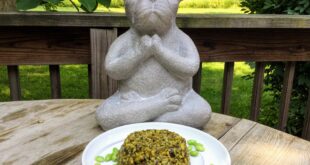
By Janae Jean and Spencer Schluter –
 For this interview, we had the honor of speaking with author, chef and Zen priest, Edward Espe Brown. Brown has authored many books on cooking, including The Tassajara Bread Book and his most recent, No Recipe: Cooking As Spiritual Practice. He was featured in Doris Dörrie’s 2007 documentary How to Cook Your Life, which showed how he blends Zen teaching with cooking lessons.
For this interview, we had the honor of speaking with author, chef and Zen priest, Edward Espe Brown. Brown has authored many books on cooking, including The Tassajara Bread Book and his most recent, No Recipe: Cooking As Spiritual Practice. He was featured in Doris Dörrie’s 2007 documentary How to Cook Your Life, which showed how he blends Zen teaching with cooking lessons.
Janae: Was there anything specific from your childhood that started you on your cooking journey?
Edward: When I was 10, I visited my aunt in Falls Church, VA. After sightseeing in Washington, DC, my brother and I came back and her home was aromatic with the smell of fresh-baked bread. I found it heavenly… intoxicating. She served the bread with butter. We used margarine in my family, so it was so delicious–the aroma, the flavor, the taste and the sensation of eating it. I was so inspired that I decided I would learn how to make bread, and I would teach others. When I got home, I asked my mom if she could teach me to make bread. She said, “No, yeast makes me nervous.” Eventually, about 10 years later, I was at Tassajara (before the Zen center arrived) and the cooks there taught me to make bread. That led to The Tassajara Bread Book in 1970.
Spencer: What is the chef’s role at a Zen center? What role does the kitchen play in the life there?
 EEB: I was the first head cook at Tassajara. I came in May 1967 through 1969, about two years. In Zen, it’s considered that there should be a student who’s the head of the kitchen. Zen master Dogen, who lived in the 13th century and is considered to be the founder of our school, the Soto Zen School, wrote a wonderful chapter with instructions for the head cook. I use some of the teachings from that in No Recipe. One of the first things he says is the cook needs to have “the mind that seeks the way,” otherwise known as “beginner’s mind.” It’s about finding out, studying, not just repeating what you already know. You’re finding out what to do. Suzuki Roshi said, “Zen is like feeling your way around in the dark. You don’t know where you’re going, but you move carefully, and then, step-by-step you find your way.” You might think it’s better to know where you’re going and how to get there. But, he said, “When you know where you’re going, you want everybody to get out of your way, and you’re not so sensitive.” When you try to make everything happen, you’re usually not as sensitive to things as you might be otherwise. You’re more responding to the circumstances.
EEB: I was the first head cook at Tassajara. I came in May 1967 through 1969, about two years. In Zen, it’s considered that there should be a student who’s the head of the kitchen. Zen master Dogen, who lived in the 13th century and is considered to be the founder of our school, the Soto Zen School, wrote a wonderful chapter with instructions for the head cook. I use some of the teachings from that in No Recipe. One of the first things he says is the cook needs to have “the mind that seeks the way,” otherwise known as “beginner’s mind.” It’s about finding out, studying, not just repeating what you already know. You’re finding out what to do. Suzuki Roshi said, “Zen is like feeling your way around in the dark. You don’t know where you’re going, but you move carefully, and then, step-by-step you find your way.” You might think it’s better to know where you’re going and how to get there. But, he said, “When you know where you’re going, you want everybody to get out of your way, and you’re not so sensitive.” When you try to make everything happen, you’re usually not as sensitive to things as you might be otherwise. You’re more responding to the circumstances.
I tell a story in the book about those years. I barely knew how to cook myself. I was definitely in the dark as the head cook. One day we had to wash spinach for about 60 people. I looked in the cookbooks, but there was no cookbook that told you how to cook spinach, how to wash spinach. It was all spanakopita… soufflé… spinach-cheese pie… spinach lasagna. Nobody told you how to just cook spinach. The recipes tended to want you to take stems off the spinach, so it’s very tender. It wasn’t very long before one of the students said, “Ed, I tried eating the stemmed spinach, it’s not very tough. It’s tender. It’s easy to eat. It’s only going to get more tender when we cook it.” So I tasted one, and I said, “You’re right! Let’s leave the stems on.” So, you don’t need directions for this. One of the sayings of a Zen master Tenkei is “See with your eyes, smell with your nose, taste with your tongue; nothing in the universe is hidden. What else would you have me say?” Of course, you want him to say how to get it to come out the way it should so that it’s no stress, easy and not much work. There’s no answer to that.
JJ: What do you mean by “cooking as a spiritual practice?”
EEB: It’s an interesting subject because there’s not a lot of language for what’s “spiritual.” What passes for spiritual is following your breath… being mindful. But, as soon as someone starts to practice mindfulness, they apply the same rules, of what I call “the horizontal world” to it. I like to think of the horizontal world where things are compared to other things. “How good is your cooking? Are you a success?” The vertical world is “Show up. Do your best. Be sincere.” You bring your energy and your gifts from beyond this world. That’s my model for what’s spiritual. This is something that Dogen emphasized for the cook, being sincere and wholehearted. We’re so involved in this horizontal world. It’s also the world of what I would call performance. In that sense, my encouragement is to shift from performance to a world of presence. You respond to the world as it’s arising and take care of it. You do what you can to bring out the best in others and yourself. But, bringing out the best does not mean that at the end you compare your best to other people’s best and see whose best is better. If you do that, you’re back in the horizontal world. At the end of the day, rather than cooking to gain praise, acknowledgment, gratitude or appreciation, you’re cooking, in the spiritual sense, to make an offering from beyond, from the divine, from Source. You’re making an offering to this world.
Subscribe to the Conscious Community Podcast on iTunes, GooglePlay, Stitcher, TuneIn and YouTube.
Janae Jean serves as editor, social media manager and podcaster for Conscious Community Magazine. She has an extensive background in new media and music education. Janae is actively researching using electronically generated sounds for healing. Visit www.janaejean.com and www.perennialmusicandarts.com for details about Janae’s upcoming classes, lesson information, workshops, shows, articles and projects.
Spencer Schluter is the advertising account manager, social media manager and podcaster for Conscious Community Magazine. His experience includes visual communications, advertising, social media, marketing, public relations and business development. Visit www.yggstudios.com for more information about his freelance design and consulting work. He is also a master level Reiki and traditional Chinese Qigong practitioner.
Podcast: Play in new window | Download
Subscribe: RSS
 Conscious Community Magazine Dedicated to Elevating Consciousness
Conscious Community Magazine Dedicated to Elevating Consciousness





The further I read, the more the better your material is.